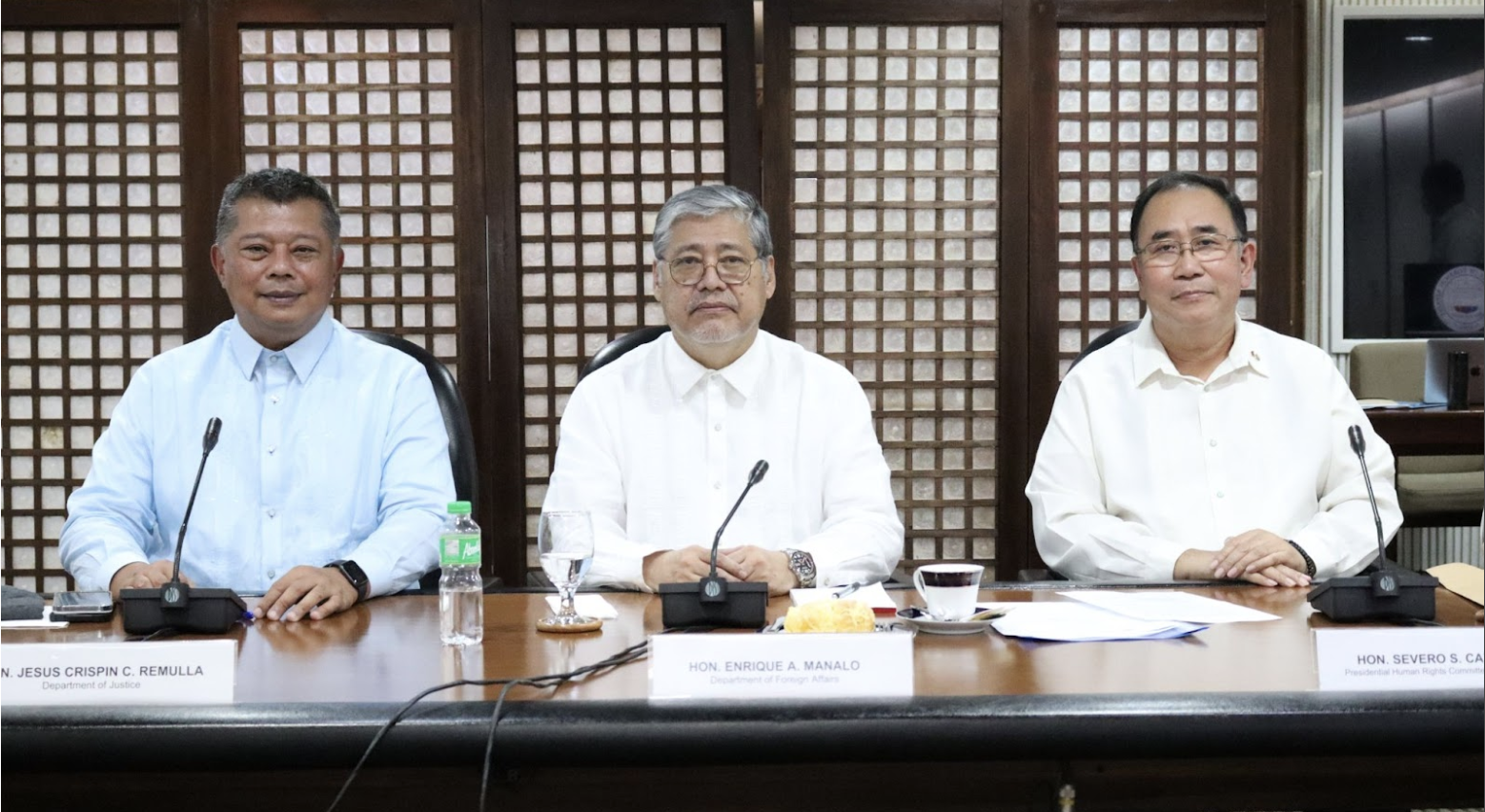News
PH committed to ‘constructive dialogue’ on human rights

Secretary for Foreign Affairs Enrique A. Manalo (middle), Secretary of Justice Jesus Crispin C. Remulla (left), and Undersecretary Severo S. Catura, Executive Director, Presidential Human Rights Committee Secretariat (PHRCS) during the virtual briefing for the diplomatic corps on 17 August 2022. (DFA-OPCD Photo by Jeffrey Mendoza via DFA/Website)
MANILA – The Philippine government has reaffirmed its commitment to constructive dialogue and cooperation on issues concerning human rights.
President Ferdinand R. Marcos Jr. has signaled that he will continue to pursue a progressive human rights agenda, according to a statement of Department of Foreign Affairs (DFA) Secretary Enrique Manalo released on Friday.
The commitment was made during a virtual conference with members of the diplomatic corps, organized by the DFA on Wednesday.
“In his State of the Nation Address, the President outlined a forward-looking and people-centered national program for inclusive growth and sustainable development,” Manalo said. “This national program builds on the Philippines’ deeply-rooted and progressive human rights agenda, sustained over decades by successive political administrations.”
Manalo said the human rights agenda frames the government’s constructive multilateral and bilateral engagements and drives its active participation in human rights review processes.
Two revalidas or constructive dialogues with Human Rights Treaty Bodies are set to take place in September and October, namely on the Convention on the Rights of the Child and the International Convention on Civil and Political Rights.
Manalo added that Manila will receive the United Nations Special Rapporteur on the Sale and Sexual Exploitation of Children in November and the UN Special Rapporteur on Freedom of Opinion and Expression in 2023.
In addition, preparations for the 4th cycle of the Universal Periodic Review in November are in full swing, the DFA said.
UNJP progress
In the same briefing, Department of Justice (DOJ) Secretary Jesus Crispin Remulla and Undersecretary Severo Catura of the Presidential Human Rights Committee Secretariat cited the progress on the country’s commitments under the three-year UN Joint Program (UNJP) on Human Rights.
“Since the UNJP’s launch last year, the DOJ continued to embark on inclusive consultations on the improved functioning of the AO35 (Administrative Order 35) Mechanism or the inter-agency committee that addresses extra-legal killings and other grave violations of human rights,” Remulla said during the meeting.
Training activities are being undertaken as part of capacity-building efforts, according to Remulla.
As of June 2022, a total of 188 prosecutors, law enforcement officers, military, and Commission on Human Rights personnel had benefited from AO35 training activities.
Preparations are likewise underway for a training program on the Minnesota Protocol on Investigation of Potentially Unlawful Death together with experts, including the UN Special Rapporteur on extra-judicial summary or arbitrary killings.
In addition, discussions are ongoing on the creation of a subworking group for victim support and rehabilitation and a “National Referral Pathway” on accountability to streamline complaint processes and facilitate investigations.
To date, Catura said the Philippines has set up 63 accredited treatment and rehabilitation facilities, 58 of which are residential and five are out-patient facilities.
A total of 2,708 admissions were recorded in all the facilities.
“Compared to cases of the previous years, there was a 14-percent increase in admission to these facilities, attributed to the resumption of operation of the rehabilitation centers and the willingness of drug users to undergo treatment and rehabilitation,” Catura said. “Every step that the Philippines takes in the anti-illegal drug campaign is made known to relevant international bodies.”
Catura added that the over 101,000 non-profit organizations and 2,000 private media entities present in the country significantly reinforce the Philippines as a “vibrant civic space”.
The UNJP was launched in August 2021 and will run until July 2024 to further improve the country’s human rights situation and provide support for its “continued fulfillment of international human rights obligations and commitments.”
As of June 2022, the UNJP Multi-Donor Trust Fund has USD1.3 million (PHP72.6 million) in contributions from Australia, the Netherlands, Ireland, Norway, and United Kingdom.
“The Philippine Government has allocated USD200,000 for fiscal year 2022 to support the implementation of the UNJP and plans to do so again in the succeeding years,” the DFA said.





















